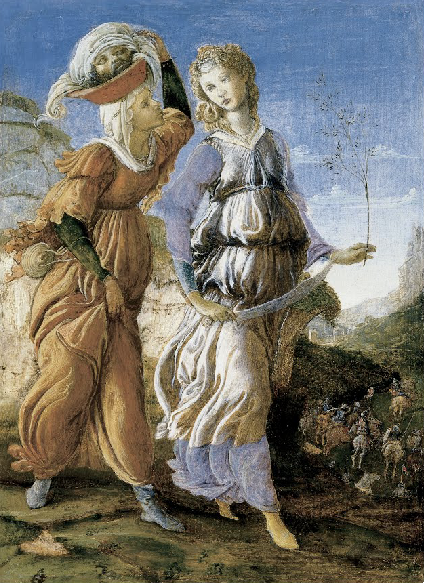|
The Handmaid Explains her Preference for Botticelli A handmaid, naturally I am nameless in the book, useful solely for carrying a basket on my head filled with oil and wine, provisions for my mistress: kohl for her eyes, essences for me to massage her body. (She shudders when my fingertips touch her back). I beautify her ready for seduction, for deception, as mad Holofernes drinks her in with copious draughts of heady wine. Of course I am written out of the action in the book. There she alone adorns herself while I am sent outside his tent to keep watch, passive. As if she could train her hair, anoint the softness of her skin with perfumed oils, kneed her yielding flesh, rub warmth into her muscles to release her ruthless strength! I disappear; she is the heroine wielding the weapon, the blade not so sharp it decapitates neatly. Bitter? No. But I was there, witness and participant. Dulled by drink, he was, nonetheless, a huge, sinewy victim. I struggled to hold him down as he awoke, his eyes ghastly as he felt the wounding. Incredulous, he thrashed in impotent frustration as she hacked and sawed. He writhed in rage ‘til it was over. I had to help sever the head from the body. It was disgusting. Exhausted, ensanguined, we fled the carnage. My role, in the book at least, was to carry the bloody head, disguised, swaddled in cloth, back, in my basket, to Bethulia. This is how Botticelli imagines me, trailing alongside the famous heroine. Spotless, both. No trace of the charnel house we’d fled, no hint of the victorious celebration to come; he paints us frozen in an uneventful moment, our flowing garments elegant, hers light, mine dark, like our faces. His face, expressionless, almost benign in the quietude of death, perches jauntily upon my head. My hand, raised, keeps the basket in place. She looks at me, sympathetic, concerned about the weight but I’m adept at balancing it, even when the burden’s unfamiliar. Her gaze is gentle, intimate, unsullied by righteous wrath or triumph. Solemn, in one hand she holds a slender twig, the sort you might pick up on a walk in the country; in the other, discreetly, his sword, its blade unstained. If not for the evidence, we might be out for an afternoon stroll. I like Botticelli. He doesn’t go in for the sensational: no streams of gore or plunging voluptuous breasts inviting you to become a voyeur, no fascination with butchery. Sanitised? No. Instead, two women, sharing an understanding. We were tasked, tasted horror, bear the evidence. I’m centre stage, not some aged crone or young accomplice, useful for filling the frame. He spares us the male gaze - we look only at each other; spares me my anonymity. I was complicit and he gives me dignity. Carolyn Thomas Carolyn Thomas is from the Neath valley in South Wales but now lives on Tyneside. After retiring from teaching in Further, Higher and Adult Education, she is enjoying the opportunity to write. She has published poetry in The Ekphrastic Review, Impossible Archetype, A Pride of Lions (Coin Operated Press) and the UK Places of Poetry project. She has reviewed for Stand magazine and her account of life as a gay woman in the 1970s is published in the Honno Press collection, Painting the Beauty Queens Orange. Stereotypically, she sports a dragon tattoo and lives with a misanthropic cat.
0 Comments
Your comment will be posted after it is approved.
Leave a Reply. |
The Ekphrastic Review
COOKIES/PRIVACY
This site uses cookies to deliver your best navigation experience this time and next. Continuing here means you consent to cookies. Thank you. Join us on Facebook:
July 2024
|




